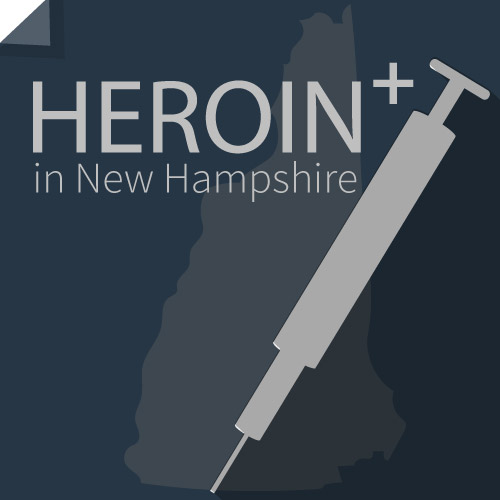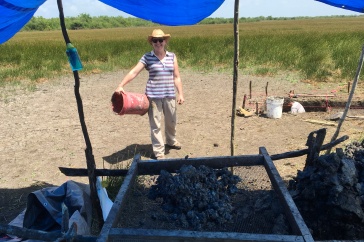
This is the third article in our series exploring how UNH alumni, faculty and students are tackling the heroin and opioid epidemic that has hit New Hampshire and many other parts of the country.
This story takes a look at the Bonfire Recovery Services, the Dover sober house co-founded by UNH graduate John Eldredge '15G. The house helps soften recovering addicts’ re-entry into the world they knew by offering a drug- and alcohol-free environment and a supportive community of peers.
Recent headlines from New Hampshire newspapers announce the grim results of the current heroin crisis: “More Than 320 People Died From Drug Overdoses In New Hampshire Last Year; Nashua's Heroin Epidemic: 16 Deaths, 142 Overdoses in 2015; Four Weekend Drug Deaths Rattle Seacoast.”
Here’s an example of the other side of the story, the one you rarely hear about: Twenty-six men, 98 percent of whom were heroin users, are living free of drugs and alcohol in a sober house in Dover. Akin to a halfway house, sober living houses offer people a safe, supportive environment while they continue on the road to recovery.
John Eldredge ’15G and Andrew West, co-founders of the Dover house, Bonfire Recovery Services, have been on that road for a while. Both have battled addiction and are in recovery. They started the self-funded, 32-bed residence after many hours spent talking about the needs of those who struggle with addiction. Eldredge, who completed his master’s in social work at UNH in May, studied the idea of a sober house as a class project.

John Eldredge '15G, co-founder of Bonfire Recovery Services
One of the issues West and Eldredge looked at was why people often relapse after treatment. Their conclusion was one supported by the National Institutes of Health, whose research found that addicts going directly from inpatient treatment back to their old lives have a greater chance of relapse.
“You have people in residential treatment receiving a high level of care for 30 days and then it drops to nothing,” Eldredge says. “They go back to their old neighborhood, their old friends, and that can set them up for failure. We try to fill the gap.”
Bonfire Recovery, opened in April 2014, serves adult men who have a history of drug or alcohol abuse. Most arrive straight from treatment and commit to staying a minimum of four months. Many stay up to a year.
Twice a week, residents attend mandatory group meetings run by the house manager, who first came to Bonfire as a tenant himself. One of the meetings is modeled after the 12-step program introduced by Alcoholics Anonymous in 1939. The other focuses on peer accountability; the men report what they are working on and the group offers feedback.
Residents also have to attend three A.A. or Narcotics Anonymous meetings a week, adhere to an 11 p.m. curfew and submit to random drug testing. Everyone has to help with household chores and hold down a job or be actively looking for one. The average age of the current occupants is 25.
"It’s about instilling hope. That makes a difference. Hope starts the day they call us.”
“Coming to us right from treatment gives them a continuum of care,” Eldredge says. “They get the support from the other residents. A new guy comes in and the other guys surround him. They say, ‘Hey, let me take you to this meeting, to the grocery store.’ Because they know what he’s going through. They came in hopeless and now, three or four months later, they are passionate about helping this guy who looks just like they did.”
Eldredge, who has an undergraduate degree in human services with a focus on addiction studies, understands the powerlessness that addiction breeds. He talks about the changes in the pathways of the brain and the time it takes to reverse the effects of drug use.
“The brain can always change and learn new ways of thinking,” Eldredge says. “You can go into treatment and learn not to use but you still need to practice that for a while. It takes time for the pathways to change again.”
“The message we want to send to the men who come here is, ‘It’s ok, you’re going to be fine, just come in and get the help you need,’” Eldredge says. “It’s about instilling hope. That makes a difference. Hope starts the day they call us.”
If that makes recovery sound simple, it isn’t. There is, he says, no silver bullet. But there are things that can be done, starting with increasing awareness about addiction.
“We need to make recovery more visible. You hear about the deaths but you don’t hear the success stories,” he says. “You rarely hear that people have recovered from heroin. But they do. And they go on and lead great lives. They go from people who had their names in the paper for committing crimes to people who are now trying to help others. It creates a shift. There is the thought, ‘Oh, that’s actually possible.’”
Rather than focusing on the stigma that surrounds addiction, Eldredge says we need to recognize it as a disease that requires proper treatment and follow up care like any other illness.
“The more we can make recovery public, the more people will see the positive. They’ll see the other side and realize after addiction, people can have greatness,” Eldredge says. “I know that’s true. I know what that person can become.”
Did you know?
According to federal data, New Hampshire ranks second to the last in the country, behind Texas, for addiction treatment access. A recent poll by the UNH Survey Center indicates one-quarter of New Hampshire adults believe drug abuse is the most important problem facing the state. The majority of respondents say state and local governments should be spending more to combat heroin abuse, and nearly half say they know someone who has abused heroin. Granite Staters Say Drug Crisis Is Most Important Problem In The State 10/7/15.
-
Written By:
Jody Record ’95 | Communications and Public Affairs | jody.record@unh.edu
















































